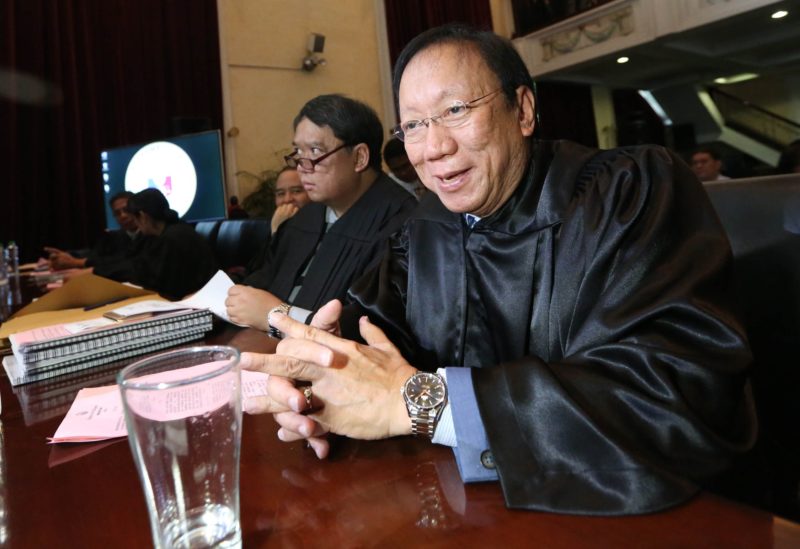Calida: Martial law gives no new legal powers

Solicitor General Jose Calida at the 1st day of the oral arguments at the Supreme Court on President Rodrigo Duterte’s declaration of Martial Law in Mindanao. INQUIRER/ MARIANNE BERMUDEZ
Solicitor General Jose Calida opined that martial law gives no new legal powers to the president. It is not legally different from the “calling out” power or the president’s ordinary power to deploy the armed forces. Martial law has great psychological effect, but no legal one. He posited these on June 14, Day 2 of the Supreme Court hearings on martial law.
Senior Associate Justice Antonio Carpio asked Calida to define martial law and specify what exactly it authorizes the president to do that cannot be done using the normal calling out power.
Calida answered that if it were a sentence, martial law ends with an exclamation point instead of a period. This did not satisfy Carpio, who rebutted: “We are talking about legal powers. We are not talking about exclamation points.”
Chief Justice Ma. Lourdes Sereno later complimented Calida’s analogy that martial law is the calling out power on steroids. With Calida unable to define martial law, Carpio joked that it might be “golpe de gulat,” or what Calida promised for Sen. Leila de Lima’s case.
Calida suggested that pursuant to his position, a “prestigious justice” such as Carpio might help reassure the public regarding their fears of martial law.
Rep. Edcel Lagman, the lead petitioner, was likewise unable to distinguish martial law from calling out. Lagman proposed to Carpio that martial law leads to extraordinary military power that affects civil liberties. But Carpio rejected this, as the Constitution requires constitutional rights to be respected even under martial law.
Lagman then pointed to the primacy of the president’s role as commander in chief, instead of chief executive. Carpio again countered that the president is always commander in chief and may deploy troops without martial law.
My first column on martial law (“10 things Duterte can’t do with martial law”, 5/29) proposed that it allows the president to govern an area through the military. Calida, however, told Carpio he rejects this. Justice Teresita Leonardo-de Castro suggested that under martial law, soldiers become law enforcers to augment or replace normal police, which is similar to what I outlined.
With Calida’s position, the marathon SC hearings appear moot. Justice Francis Jardeleza deserves a medal, though, for actually going through the facts presented by the president and Calida to justify martial law, which is what the SC was supposed to be doing in the first place.
Jardeleza went through the reports line by line and asked Lagman if he denies each fact. Justice Benjamin Caguioa, further, asked for an affidavit of AFP Public Affairs Office Chief Col. Edgardo Arevalo to disclaim his statement the day after martial law was declared that the situation in Marawi City is stable and the armed forces are in full control.
The third and last day of the hearings will begin with a closed-door session with Defense Sec. Delfin Lorenzana and AFP Chief Gen. Eduardo Año. Sereno ended Day 2 by wishing that Calida stays friends with Lagman. Calida voiced misgivings about the “backbiting” of a former party list congressman during the hearing.
* * *
React: oscarfranklin.tan@yahoo.com.ph, Twitter @oscarfbtan, facebook.com/OscarFranklinTan.




















